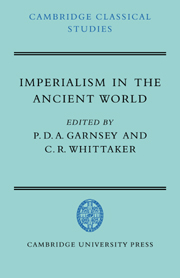Book contents
- Frontmatter
- Contents
- List of figures
- Preface
- 1 INTRODUCTION
- 2 IMPERIALISM AND EMPIRE IN NEW KINGDOM EGYPT
- 3 CARTHAGINIAN IMPERIALISM IN THE FIFTH AND FOURTH CENTURIES
- 4 SPARTAN IMPERIALISM?
- 5 THE FIFTH-CENTURY ATHENIAN EMPIRE: A BALANCE SHEET
- 6 ATHENS IN THE FOURTH CENTURY
- 7 THE ANTIGONIDS AND THE GREEK STATES, 276–196 B.C.
- 8 LAUS IMPERII
- 9 GREEK INTELLECTUALS AND THE ROMAN ARISTOCRACY IN THE FIRST CENTURY B.C.
- 10 THE BENEFICIAL IDEOLOGY
- 11 ROME's AFRICAN EMPIRE UNDER THE PRINCIPATE
- 12 JEWISH ATTITUDES TO THE ROMAN EMPIRE
- Notes
- Bibliography
- Index
2 - IMPERIALISM AND EMPIRE IN NEW KINGDOM EGYPT
Published online by Cambridge University Press: 05 June 2014
- Frontmatter
- Contents
- List of figures
- Preface
- 1 INTRODUCTION
- 2 IMPERIALISM AND EMPIRE IN NEW KINGDOM EGYPT
- 3 CARTHAGINIAN IMPERIALISM IN THE FIFTH AND FOURTH CENTURIES
- 4 SPARTAN IMPERIALISM?
- 5 THE FIFTH-CENTURY ATHENIAN EMPIRE: A BALANCE SHEET
- 6 ATHENS IN THE FOURTH CENTURY
- 7 THE ANTIGONIDS AND THE GREEK STATES, 276–196 B.C.
- 8 LAUS IMPERII
- 9 GREEK INTELLECTUALS AND THE ROMAN ARISTOCRACY IN THE FIRST CENTURY B.C.
- 10 THE BENEFICIAL IDEOLOGY
- 11 ROME's AFRICAN EMPIRE UNDER THE PRINCIPATE
- 12 JEWISH ATTITUDES TO THE ROMAN EMPIRE
- Notes
- Bibliography
- Index
Summary
The treatment of a period of ancient Egyptian history under a heading which belongs very much to the modern world requires something of a defensive introduction. The charge is easily made that simply by using the words ‘imperialism’ and ‘empire’ a host of complex and debatable issues are prejudged and cast into a misleading and inappropriate mould. Certainly the ancient Egyptians themselves seem to have known of no words which can be translated as ‘imperialism’ or ‘empire’, but neither, for that matter, did they have words for ‘government’, ‘administration’ and ‘history’, nor even, despite its pervasiveness in Egyptian civilization, was there a word ‘religion’. This is something that can be encountered across the whole range of subjects on which the Egyptians wrote. Thus, they possessed a technical vocabulary for solving mathematical problems, but no word which can be translated ‘mathematics’. They acted without seeing the need to abstract and refer separately to the activity as an independent phenomenon. The verbal and mental sequence in Egypt was not from the particular to the abstract, it was to metaphor and religious symbolism. Yet, conversely, whilst we may judge the Egyptian vocabulary to have been weak in just those areas that we rate most highly, it is also true that our own vocabulary and range of concepts is inadequate for coping with the heart of the Egyptian intellect for which we can offer only the sadly degraded term ‘religion’.
- Type
- Chapter
- Information
- Imperialism in the Ancient WorldThe Cambridge University Research Seminar in Ancient History, pp. 7 - 58Publisher: Cambridge University PressPrint publication year: 1979
- 4
- Cited by



